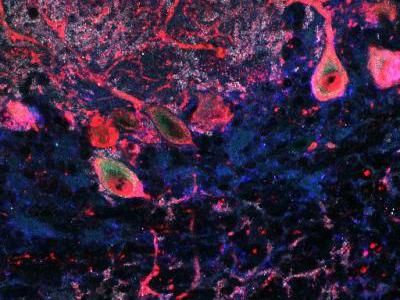A potential new class of fast-acting antidepressant
More than 1 in 10 Americans take antidepressants, but these medications can take weeks—and for some patients, months—before they begin to alleviate symptoms. Now, scientists from the University of Chicago have discovered that selectively blocking a serotonin receptor subtype induces fast-acting antidepressant effects in mice, indicating a potential new class of therapeutics for depression. The work was published in Molecular Psychiatry.
"One of the biggest problems in the treatment of depression today is a delay in onset of therapeutic effects. There has been a great need to discover faster-acting drugs," said Stephanie Dulawa, PhD, associate professor of psychiatry and behavioral neuroscience at the University of Chicago and senior author of the study.
Delayed onset of antidepressant therapeutics can significantly impact patients, especially those with major depressive disorder, who often spend months switching between ineffective medications. Currently, only two drugs—ketamine and scopolamine—exhibit rapid onset. Due to severe side effects, however, neither is suitable for human use.
In seeking a new class of fast-acting therapeutics, Dulawa and her team tested biological pathways that had previously been shown to generate antidepressant effects but had never been studied for rate of onset. They looked at different subtypes of serotonin receptors, proteins that are binding partners for serotonin, a neurotransmitter that has been shown to regulate mood, memory and appetite.
Of these subtypes, serotonin 2C receptors stood out. Selectively blocking these receptors in mice significantly reduced depression-like behaviors in only five days, compared to a minimum of two weeks for a control antidepressant medication.
"We observed fast-acting therapeutic effects in multiple behavioral tasks after we administered compounds that selectively block serotonin 2C receptors," said Mark Opal, a graduate student at the University of Chicago and lead author of the paper. "We began our measurements at five days, but we think there's a possibility it could be effective even sooner than that."
Serotonin 2C receptors normally inhibit the release of dopamine, another neurotransmitter commonly associated with mood, from certain neurons. When 2C is blocked, the researchers believe, more dopamine is released into regions of the brain such as the prefrontal cortex. The team also observed the induction of biomarkers that indicate antidepressant action.
This is the first new biological mechanism that has shown the ability to rapidly alleviate symptoms of depression since ketamine and scopolamine, and it potentially represents a much safer alternative. Some current antidepressants on the market already affect serotonin 2C receptors, although not selectively, and Dulawa believes the safety profile is favorable for human use. The team is now investigating compounds suitable for clinical trials.
"One of the primary advantages to our discovery is that this is much more of an innocuous target than others that have been identified," Dulawa said.
Most read news
Topics
Organizations
Other news from the department science

Get the life science industry in your inbox
By submitting this form you agree that LUMITOS AG will send you the newsletter(s) selected above by email. Your data will not be passed on to third parties. Your data will be stored and processed in accordance with our data protection regulations. LUMITOS may contact you by email for the purpose of advertising or market and opinion surveys. You can revoke your consent at any time without giving reasons to LUMITOS AG, Ernst-Augustin-Str. 2, 12489 Berlin, Germany or by e-mail at revoke@lumitos.com with effect for the future. In addition, each email contains a link to unsubscribe from the corresponding newsletter.





















































